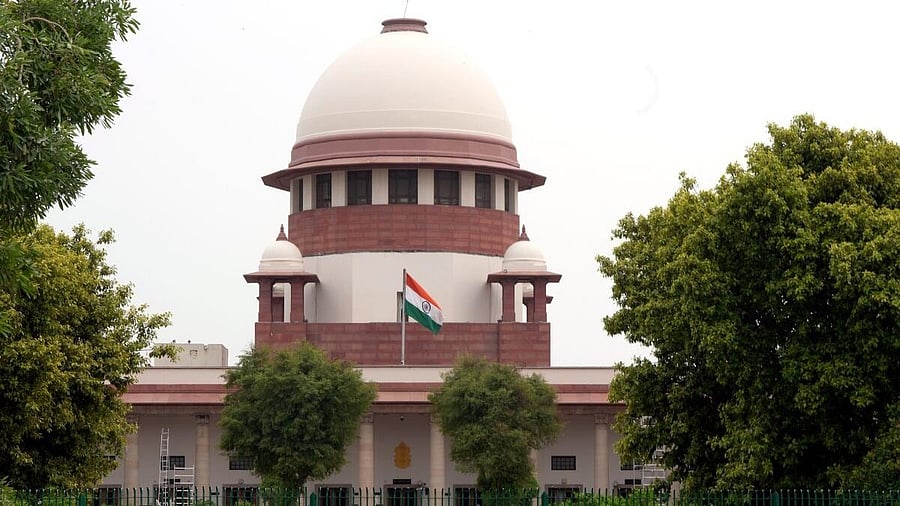
Supreme Court of India.
Credit: PTI Photo
New Delhi: The Supreme Court on Wednesday said that the government cannot distribute State’s largesse and normally it ‘must’ get the ‘maximum value’ of the resources, especially when its assets are passed over to private individuals or entities unless there are good and cogent reasons for doing so in special circumstances.
A bench of Justices Dipankar Datta and Manmohan set aside the Telangana High Court's orders which have held that the respondent Dr Pasupuleti Nirmala Hanumantha Rao Charitable Trust is the absolute owner of the land situated in Medak District.
The HC also said the State having sold the land on payment of market value could not have placed any condition restricting the enjoyment of the land and such restrictions were void under Section 10 of the Transfer of Property Act, 1882.
Referring to the Transfer of Property Act and the Telangana Alienation of State Lands and Land Revenue Rules, 1975, the bench said, "When the State had allotted land to public trust for public purpose, the State cannot be put in the normal classical inter vivos party’s position as public interest is supreme and must prevail."
Examining the Telangana government's appeal, the court found the Trust, despite having accepted the conditions of grant of alienation laid down under the Andhra Pradesh Board Standing Orders, violated the conditions as the said land was not used for the purpose for which it was granted, i.e. for the purpose of a charitable trust.
"On the contrary, a colony was cut on the said land, which was sub-divided into plots, some of which have already been sold to third parties vide different sale deeds in violation of the conditions of allotment. This court is of the opinion that the decision to cut a colony in violation of the specific conditions on which land had been allotted cannot be termed as anything else but fraud on the statute," the bench said.
The state government contended the Trust had fraudulently executed a GPA without making any reference to the allotment letter of February 8, 2001 or the conditions on which the allotment of said land had been made.
The state counsel claimed that the Power of Attorney holder had cut a colony by the name ‘Eden Orchard’ on the land allotted to the Trust and even some of the plots had been sold to third parties without disclosing the conditions on which the initial allotment had been made.
The counsel for the trust contended the subject land was sold by the state government after following the due procedure on payment of market value. The allotment was not at any concessional rate and the alienation contained only a general condition that “the land would be utilised only for the purpose for which it is allotted” without actually specifying the exact purpose for the allotment.
Therefore, he submitted that there was no restriction or condition imposed on the usage of the land. In any event, any such condition on usage would be violative of Section 10 of the TPA, as held by the high court.
The court, however, explained that the 1975 Rules and the Board of Revenue Standing Orders operated in a completely distinct space and are not eclipsed by Section 10 of the TPA.
"Government cannot distribute State’s largesse and normally the State ‘must’ get the ‘maximum value’ of the resources, especially when State-owned assets are passed over to private individuals/entities unless there are good and cogent reasons for doing so in special circumstances," Justice Manmohan wrote in a 13-page judgment on behalf of the bench.
The court held that the high court fell in error in making out a case of sale, ignoring the fact that the appellant-State had allotted land to the Trust under a statutory scheme of alienation/allotment.
"In any event, in 2011, Dr Pasupuleti Niramala Hanumantha Rao, without disclosing that he is a trustee of the Trust to whom the land had been allotted by the state government, appointed Syed Javed as GPA holder under the Registration Deed of June 18, 2011. It is pertinent to mention that the conditions on which the allotment had been made by the State Government were not mentioned/disclosed in the GPA which reflects malafides of the respondent-Trust (allottee)," the bench said.
